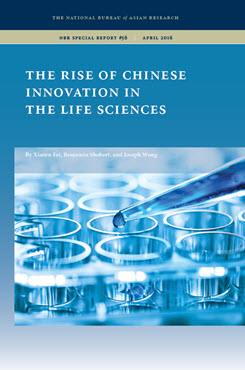Priming the Pump
Applying Lessons Learned from High-Tech Innovation to the Life Sciences in China
This essay explores parallels between China’s approaches to clean technology and the life science sector in order to better understand the potential impact of Chinese innovation on the development of the global life science industry.
EXECUTIVE SUMMARY
MAIN ARGUMENT
The success of China’s efforts to close the gap with Western high-technology sectors, and in the case of clean technology to actually become a global leader, points toward the potential—but not the inevitability—of similar outcomes in the life sciences. Still, there are reasons to believe that the country’s policies to develop domestic success stories may fall short of similar endeavors in other segments of China’s economy. While the pursuit of indigenous drug discovery aligns with the country’s overarching objective to develop higher-technology industries, the time frame within which life science innovation creates tax-paying entities is much longer than in other sectors. In addition, the paucity of dedicated reimbursement for innovative molecules limits the country’s ability to use financial triggers to foster domestic champions. Moreover, a significant obstacle to domestic innovation in China remains the slow pace of the drug approval process. None of this is to suggest that Chinese stakeholders lack insight or ideas specific to innovative therapies that may well benefit global health; rather, it is to say that China’s efforts in the life sciences are likely to lag behind the outcomes, efficacy, and disruptiveness of analog endeavors in other sectors that were set in motion by coordinated policies from the central government.
POLICY IMPLICATIONS
In order to ensure that China’s development proceeds in a way that benefits Chinese stakeholders, multinational companies, and the global market, the following three policy objectives are most important:
- Western companies and governments should use this moment to pay attention to domestic reforms that ensure that their respective markets remain globally competitive. The life science community needs a very unique ecosystem that combines government funding, strong intellectual property laws, academic research, venture capital, stable public equity markets, and mature healthcare reimbursement systems.
- In order to ensure that China’s goals do not create unnecessary tension with its trading partners, Western governments need to continue advocating for additional and accelerated reforms within the China Food and Drug Administration, an argument made most credibly by focusing on how these reforms benefit domestic Chinese innovators.
- The Chinese government must update its pharmaceutical reimbursement standards to provide transparency and to articulate and provide substance to its view on the connection between innovation and reimbursement.
Benjamin Shobert is Senior Associate for International Health at the National Bureau of Asian Research and Founder and Managing Director of Rubicon Strategy Group.



